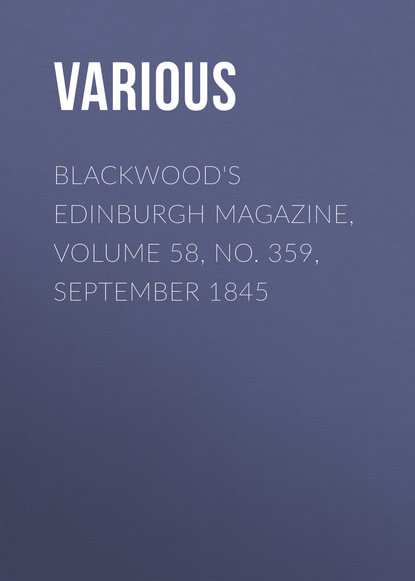По всем вопросам обращайтесь на: info@litportal.ru
(©) 2003-2024.
✖
Blackwood's Edinburgh Magazine, Volume 58, No. 359, September 1845
Автор
Год написания книги
2017
Настройки чтения
Размер шрифта
Высота строк
Поля
The tribes of savage warriors inhabiting the Kipchak, or table-land of Tartary, have been distinguished by the name of the Golden Hordes. There is a magnificent lyric on their Battle-charge, by Dr Croly, in the Friendship's Offering for 1834.
8
Essays on Natural History, chiefly Ornithology. By Charles Waterton, Esq., author of "Wanderings in South America." Second Series; with a continuation of the Autobiography of the Author.
9
"'I do hereby disclaim, disavow, and solemnly abjure any intention to subvert the present Church Establishment within this realm,' &c. In framing that abominable oath, I don't believe that Sir Robert Peel cared one fig's-end whether the soul of a Catholic went up, after death, to the King of Brightness or descended to the King of Brimstone. His only aim seems to have been to secure to the Church by law established the full possession of the loaves and fishes." —Essays, 1st series, p. 19.
10
A long-protracted lawsuit between this artist and Prince Giustiniani has since attracted much public notice. On cleaning a painting apparently of little value, which he had purchased at a sale of the refuse of the prince's gallery, Signor Vallati detected traces of a superior production beneath that painted over it, on removing which, the long-lost duplicate of Correggio's Reading Magdalen was brought to light. A claim was now set up by Prince Giustiniani for the restitution of the picture, or payment of its full value: – but the cause, after being carried from one tribunal to another, was at last decided in favour of the right of Vallati to his prize.
11
A close analogy, according to this system, existed between pigs and humming-birds – each representing the gliriform type in their respective circles, and resembling each other in their small eyes and suctorial propensities! – See Swainson's Classification of Birds in Lardner's Cabinet Cyclopædia, i. 43.
12
"Mopso Nisa datur. Quid non speremus amantes?
Jungentur jam gryphes equis."
Virgil, Eclog. viii. 26.
13
A Popular and Practical Introduction to Law Studies, &c. &c. By Samuel Warren, Esq., F.R.S., of the Inner Temple, Barrister-at-Law.
14
P. 71.
15
The following extract from a memoir of Lord Wynford, written evidently by a lawyer, manifests, in rather an amusing manner, the esprit de corps of the profession, and shows how the excitement of the contest between the advocates effaces the dull interest of what are called the merits of the case. Note how combative, how military, is the style: – "He (Lord Wynford) was a dangerous, because he was a most watchful and enterprising adversary. You could not any more sleep in his neighbourhood than could the Duke while Massena was near, though he might, in the neighbourhood of others, enjoy some repose. But if you never could be sure of his not making some venturous move himself, and were thus kept on the watch, so also you could not venture upon moves in the hope of his eyes being closed. It may almost safely be pronounced that he never failed to see or to profit by the slip of his adversary; to say that he never, seldom, made slips himself, would be very wide of the truth. In fact, he was not always a safe leader. Circumspect enough to see when his antagonist failed, he took a very narrow, or very one-sided, view of his own risks. Bold to rashness, hasty in his resolutions, quick in all his thoughts and all his movements, he was often in dangers wholly needless to be encountered; and though he would occasionally, by desperate courses, escape beyond all calculation from risks, both inevitable and of his own seeking, he could not be called a successful advocate." —Article on Lord Wynford, No. III., Law Review.
16
Correspondence between Count Münster and the Baron von Stein, in vol. ii. of the Lebensbilder aus dem Befreiungskriege, Jena: 1841.
Letters of Baron Stein to Baron Gagern, in Von Gagern's Antheil an der Politik, vol. iv. Stuttgart and Tübingen: 1833.
17
Besides the correspondence of Münster and Gagern, which refer only to the latter part of Stein's life, from 1811 to his death, we have only a notice in the Conversations Lexikon, and a short biographical sketch by Arndt, (the Baron's secretary,) appended to his Erinnerungen, (Leipsig, 1840,) to guide us in the early part of Stein's career. There are some notices in the body of Arndt's Reminiscences, in Varnhagen's Memoirs, and in some others, none of which, however, go further back than the year 1811.
18
In Prag halten sich die stärksten Mächte und Autriche zum Hassen gegen Napoleon Zugammengehäuft.– Varnhagen von Ense, iii. 195, first edition.
19
"Donnerschwangere Fulgurationer." – Hormayr, in the Lebensbilder, i. 63.
20
Scharnhorst, Count Dohna, and President von Schoen, mentioned by Stein in a previous letter not translated.
21
Essai sur les Fictions.











